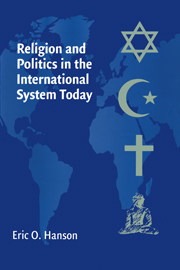Book contents
- Frontmatter
- Contents
- Acknowledgments
- Religion and Politics in the International System Today
- Introdution: The view from Silicon Valley
- I RELIGION AND POLITICS IN THE NEW GLOBAL PARADIGM
- II RELIGION IN CONTEMPORARY WORLD POLITICS
- 5 The West: Christianity, Secularization, and Immigration
- 6 East Asia: Modernization and Ideology
- 7 South and Central Asia: The Legacies of Gandhi and Khomeini and the Bomb
- 8 The Middle East and North Africa: Jewish and Islamic Politics
- 9 Latin America: Indigenous Religions, Christianity, and Globalization
- 10 Religion and Politics for the Next Millennium
- Appendix I Thirty Years of Nobel Peace Prizes, 1975–2004
- Appendix II Paradigm Chart and Category Questions
- Index
9 - Latin America: Indigenous Religions, Christianity, and Globalization
Published online by Cambridge University Press: 06 January 2010
- Frontmatter
- Contents
- Acknowledgments
- Religion and Politics in the International System Today
- Introdution: The view from Silicon Valley
- I RELIGION AND POLITICS IN THE NEW GLOBAL PARADIGM
- II RELIGION IN CONTEMPORARY WORLD POLITICS
- 5 The West: Christianity, Secularization, and Immigration
- 6 East Asia: Modernization and Ideology
- 7 South and Central Asia: The Legacies of Gandhi and Khomeini and the Bomb
- 8 The Middle East and North Africa: Jewish and Islamic Politics
- 9 Latin America: Indigenous Religions, Christianity, and Globalization
- 10 Religion and Politics for the Next Millennium
- Appendix I Thirty Years of Nobel Peace Prizes, 1975–2004
- Appendix II Paradigm Chart and Category Questions
- Index
Summary
This fifth regional chapter covers Latin America. As in the previous four chapters, the text must both demonstrate the usefulness of the paradigm and explain the regional characteristics of political-religious identities, ideologies, and institutions. In terms of the paradigm, a Latin American analyst should focus on the contemporary interactions of the political and economic systems. Regional and national economies maintain overwhelming political significance. The communication system takes secondary importance. Global publicity about human rights violations and politically oriented telenovelas both remain relevant. Since Argentina and Brazil renounced nuclear weapons in the 1970s, the military system has consisted of “low-level” civil wars and uprisings against authoritarian regimes.
At the beginning of the post–Cold War period, most Latin American countries found their political-economic equilibrium in democratic politics and integration into the global market under United States hegemony, best symbolized by the North American Free Trade Agreement (NAFTA) of 1994. In the last decade, however, this “Washington Consensus” has failed to produce security and development, so that a majority of Latin Americans favor economic efficiency over political democratization, even if it means authoritarian leadership. National political chaos has increased in the region, especially among the Andean countries, while the “Big Three” ABC (Argentina, Brazil, and Chile) nations have all opted for center-left governments and more distance from the United States. All analysts are struck by the tremendous social stratification on the continent.
- Type
- Chapter
- Information
- Religion and Politics in the International System Today , pp. 260 - 294Publisher: Cambridge University PressPrint publication year: 2006



